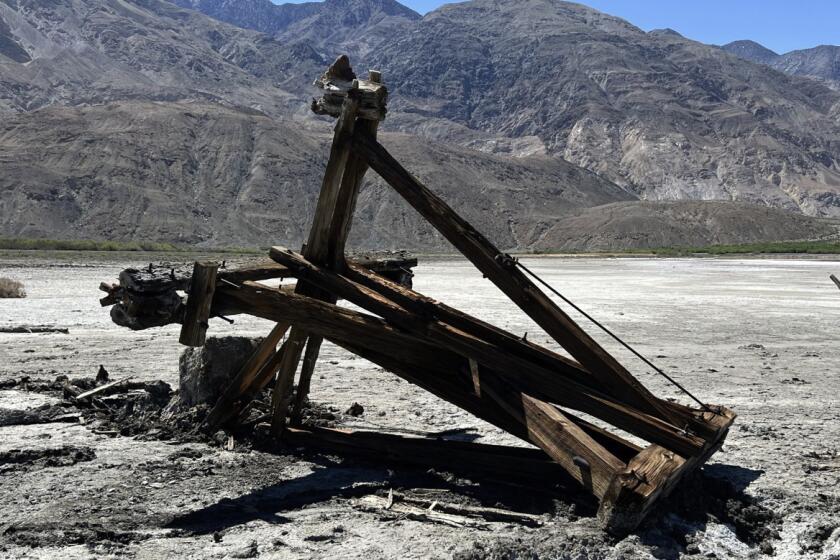To Businesses’ Relief, PUC Halts Voluntary Conservation Program
Citing threats to the state’s economy and public safety, the California Public Utilities Commission on Friday halted a voluntary power conservation program that was designed as a buffer against blackouts but had hundreds of businesses screaming.
Southern California Edison officials credit the program with helping avert blackouts like those that have struck Northern California and say the suspension makes it more likely that outages will hit the Southland too.
The commission suspended the “interruptible rate program” for 1,400 industrial users statewide who had voluntarily agreed to curtail energy use when supplies are short and in return receive discounted power rates.
As the energy crisis deepened, with more and more energy alerts, businesses found themselves in a bind: They either had to cut electricity use under their agreements with utilities or pay significant penalties.
“If they curtail service, for many customers this means closing their operations or businesses with deleterious effects on themselves and the California economy,” commission members wrote in their decision. “The harmful effects include lost sales, lost revenues, lost productivity, forgone wages, layoffs, unemployment. . . . For some customers, such as hospitals and prisons, this choice threatens public safety.”
The program, said commission President Loretta Lynch, is broken and needs to be stopped immediately, reassessed and retooled. “We realized business customers were being interrupted most of their days and most days,” she said after the commission’s 3-0 vote. “This is not what the program was meant to be. . . . We should not put the burden of this crisis on 1,400 businesses.”
With little public notice and two commissioners absent, the PUC took swift action after the California Energy Commission warned Jan. 19 that the program was affecting the ability of two major oil delivery companies to supply refineries, airports and other important facilities throughout the state.
While considering waivers of penalties for those two companies, the PUC concluded that the program was harming hundreds of businesses, many of which complained to the PUC and utilities that the unanticipated frequency of interruptions this year was costing them dearly.
The commission directed the utilities to stop billing those customers for any penalties assessed for failure to curtail energy use. However, the panel ordered utilities to notify those big customers in advance of power shortages and urged the customers to voluntarily reduce their energy use “to the maximum extent feasible.”
Edison Fears That Crisis Will Worsen
In a statement, Southern California Edison expressed concern that suspending the program could exacerbate the crisis. “Our customers’ cooperation with this program is the main reason our system has avoided rolling blackouts to date,” company officials said. They acknowledged that their customers across the region have suffered productivity declines and financial losses, as well as severe penalties when they did not curtail their power use.
Edison had plenty of unused capacity for interruptions under the program, which includes 1,000 Southern California businesses. The utility is allowed 25 interruptions, totaling 160 hours--and it has used only about half of those, officials said. The suspension of the program, said spokesman Steve Conroy, “makes it much more a possibility that we will have rolling blackouts in Southern California. . . . It will require us to look for additional resources.”
Edison’s program was in somewhat better shape than that of Pacific Gas & Electric Co., which supplies power in Northern and Central California. Service to all but 30 of PG&E;’s 169 customers in the program has been interrupted to the maximum extent allowed this year under their agreements. The company says it has a 95% compliance rate among its customers, and levied only $2 million in fines last summer after 13 curtailments. That compares with $50 million a year in rate savings for participating customers.
PG&E; officials defended the program after the hearing. “It’s not broken,” said Les Giuliasi, director of regulatory relations. “It’s been a very useful buffer, so customers would not experience blackouts.”
The interruptible customers, he said, “knew they were taking a risk” in return for a rate discount that averages 15%.
D.J. Smith, lobbyist for the California Large Energy Consumers Assn., praised the commission action, saying it relieved “the tremendous financial burden of folks who have the choice of maintaining their business and keeping people employed or shutting down their production, or . . . ignoring shutdown notices and paying prohibitive penalties.”
He said that, instead of the program, his association would like to see the state schedule outages that would allow customers to voluntarily reduce their electricity demand in return for some compensation.
Across the state, business owners reacted with relief and vindication.
“This is the first logical step that’s been taken in this whole crisis,” said Lourenco Goncalves, chief executive of California Steel Industries Inc. “We’ve been working very hard to get someone in Sacramento to listen to us.”
Power interruptions have wreaked havoc on California Steel’s operations. Its Fontana mill has been shut down 13 times in January alone, for as much as 18 hours at a stretch. The interruptions have presented the firm with a costly choice. Idling the plant for a day costs $2.4 million in lost production, according to Goncalves. Continuing to operate means hefty penalties--$850,000 paid so far.
More than a dozen manufacturers lined up Friday to vent their frustration at a gathering in Irwindale of 150 businesspeople, public officials and utility executives. Their message: Jobs and businesses are at risk if they continue bearing the brunt of California’s energy crisis.
“Never in our wildest dreams--or nightmares--could we have believed we’d see 24 interruptions in the past year,” said Edward Beers, plant manager of Miller Brewing Co.’s Irwindale facility, which has temporarily furloughed 200 employees. “No businessperson with a right mind would enter into an agreement, knowing what we know now.”
Beers and others said the unprecedented number of shutdowns turned what was a money-saving strategy into a costly liability that threatened their businesses. They are also furious that the PUC forced many big users to remain in the program until March, even though their contracts were supposed to release them in November.
*
Reiterman reported from San Francisco and Dickerson from Los Angeles.
More to Read
Start your day right
Sign up for Essential California for news, features and recommendations from the L.A. Times and beyond in your inbox six days a week.
You may occasionally receive promotional content from the Los Angeles Times.






